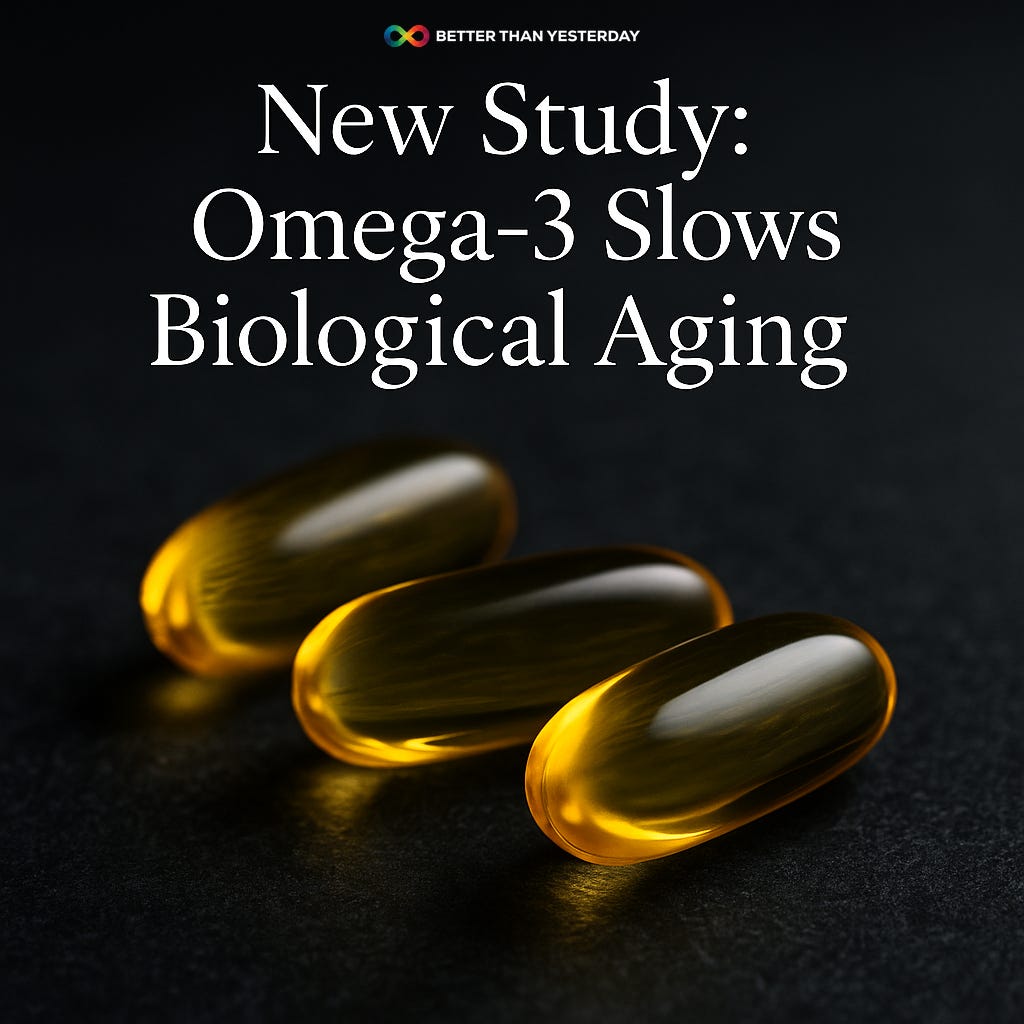Omega-3 Help You Age Slower: Science Just Confirmed It
New clinical trial shows daily omega-3 supplements reduce biological aging in older adults
For years we’ve heard omega-3s are good for your heart, brain, joints. But now? Science says they might actually slow how fast you age. And not just theory — this was tested in a proper, 3-year clinical trial. 🧬
Let’s break down what happened, why it matters, and how to try it yourself (without any fancy anti-aging clinic).
🧪 What the Study Found (Real Science, Not Wellness Hype)
A brand-new study published in Nature Aging (Feb 2025) followed 777 older adults over three years. It’s called the DO-HEALTH Bio-Age trial, and it tested how omega-3, vitamin D, and a simple home exercise program impacted biological aging.
Not in a “look younger” way. They actually measured it using epigenetic clocks — tools that look at DNA methylation to estimate how old your body really is on the inside.
Here’s the bottom line: participants who took 1 gram of omega‑3 per day aged about 3–4 months slower over 3 years. Small but real.
🧬 What’s an Epigenetic Clock?
Your actual age is on your passport. Your biological age is what your body’s cells and systems say.
These DNA-based “clocks” have names like:
PhenoAge — linked to disease and mortality
GrimAge — used to predict lifespan
DunedinPACE — shows how fast you’re aging now
Omega‑3 supplementation slowed all three in the trial. Especially DunedinPACE, which is seen as the most accurate clock for tracking how fast your body is wearing down.
🔗 Stronger Together: Omega-3 + Vitamin D + Exercise
Here’s the twist: when omega‑3 was combined with vitamin D (2000 IU) and a light home exercise routine, the results were even better.
That combo helped reduce:
Frailty risk by 39%
Invasive cancer risk by 61%
These are massive benefits, especially considering how low-cost and accessible these interventions are.
🐟 What Kind of Omega-3 Are We Talking About?
The study used 1 gram of omega-3 per day — specifically marine-based EPA and DHA. This is the same stuff you get in fish oil or high-quality algae oil if you’re vegan.
If you don’t eat fatty fish 2x a week, chances are your omega-3 levels are low. And the people with lowest omega-3 at the start of the trial saw the biggest gains.
🧠 Why It Matters — Even If You’re Younger
Yeah, the participants were all over 70. But that’s what makes it exciting. If you can slow aging this late in life, imagine starting earlier.
Omega-3 has always been linked to heart and brain health. But now we have proof it actually slows cellular aging — not just makes you feel good.
It won’t make you immortal, but it might give you more good years.
📦 Want to Try It Yourself?
Here’s a simple daily stack inspired by the study:
✅ 1 gram omega-3 (from fish or algae)
✅ 2000 IU vitamin D
✅ 30 minutes of light exercise 3x/week
You don’t need to overthink it. Just stay consistent. If you want to go deeper, ask your doctor to test your Omega-3 Index. Aim for over 8%.
📉 The Results Were Modest — But Meaningful
Let’s be clear: slowing aging by a few months isn’t a miracle. But aging is a slow process. Every small win adds up over decades.
And if this kind of result can come from just omega‑3, vitamin D, and walking around the block? That’s encouraging.
The study didn’t use any fancy tech or biotech hacks. Just nutrients and movement. And the effects were backed by changes in actual DNA patterns.
🧬My Final Thoughts
This study is a big deal. We now have hard data showing that omega-3 can:
Slow aging at the molecular level
Stack benefits with other healthy habits
Possibly lower risk of cancer and frailty
That’s enough reason for me to keep it in my stack.
We’ll keep watching this space — especially as more trials explore ways to measure and slow biological aging.
📚 Source: Nature Aging, 2025 – DO-HEALTH Trial
https://www.nature.com/articles/s43587-024-00793-y
🧬 Follow Better Than Yesterday for daily science-backed biohacking tips:
https://t.me/DailyBiohacking 🌿



